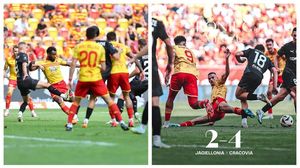The German men's biathlon relay team triumphed at the Biathlon World Championships, clinching their first medal of the event—a bronze—that has generated considerable excitement among the team and supporters.
Competing against stiff competition, the German quartet of Philipp Nawrath, Danilo Riethmüller, Johannes Kühn, and Philipp Horn navigated the challenges of the race with remarkable composure. The team completed the 4 x 7.5-kilometer course with ten reloads and no penalties, finishing third behind Norway and France. Norway finished strong with Endre Stroemsheim, Tarjei Bö, Sturla Holm Laegreid, and Johannes Thingnes Bö taking the gold without any penalties, clocking 1:18:18.1, followed by France's team of Claude brothers Emilien and Fabien, along with Eric Perrot and Quentin Fillon Maillet, securing silver 41.9 seconds later. Germany ended the race 1:35.9 behind Norway and just 18.1 seconds ahead of Sweden.
Philipp Horn, the anchor leg for Germany, expressed sheer joy at the racing achievement, exclaiming, "Ach Du Sch..., war das geil" (Oh my God, was it awesome) after crossing the finish line. Reflecting on the mental battle before his last shooting, Horn admitted he felt slight doubts creeping in, saying, "I thought to myself: 'Don't mess this up! Today is your day. These opportunities don't come often; pull yourself together.'" He completed the standing shooting flawlessly, maintaining his lead over the Swedish competitor Sebastian Samuelsson.
For several of the athletes involved, this was an emotional moment. Johannes Kühn, competing at his sixth world championships and sobbing tears of joy, noted it was his first medal at this level. Nawrath and Riethmüller, both clinching their inaugural medals, shared the thrill of the victory as they celebrated with their teammate Horn, who previously won bronze at the 2020 championships.
Nawrath spearheaded the race for Germany, demonstrating strategic shooting technique at the onset. Tasked with maintaining contact with leading teams, he successfully handed off to Riethmüller. While he struggled during the shooting segments—recording three reloads—he ran impressively to stay competitive, finishing sixth but just over two seconds adrift from bronze at the first exchange.
Riethmüller faced his challenges, recording one reload on the prone and two more on the standing shoot. Despite running the seventh-best lap time, he passed the baton to Kühn as they remained within close reach of the podium. "I am satisfied with my performance overall, but I need to improve my shooting consistency," Riethmüller assessed post-race.
Next up was Kühn, who had his standout moment, shooting perfectly without any penalties, pushing Germany firmly onto the path toward bronze. He recalled, "That was one of my best legs; on the track, it was tough, and I didn't expect to feel so exhausted by the end."
The finale came down to Horn, who needed to fend off Samuelsson's challenge. Under immense pressure, Horn went out with almost two seconds head start but found himself neck-and-neck on the final push. With only one reload needed by Samuelsson during the standing shoot, Horn calmly finished with 13.6 seconds to spare, ensuring Germany held onto their bronze medal with stellar teamwork.
Reflecting on the race's climax, Horn reveled not only in the victory but also the camaraderie and motivation among the team, their shared experience eleving the achievement, which will surely propel them toward more success. Emphasizing the significance of the medal, Horn stated, "This confirms all the hard work we put in; it’s not just for us, but for our nation as well!"
Norway’s dominance was evident, with Bö celebrated his last championship race with triumphant runs and gestures, capping off the event with well-deserved applause. Meanwhile, the German embrace of their bronze medal showcases the team’s resilience and determination.



